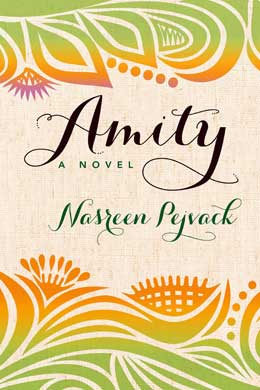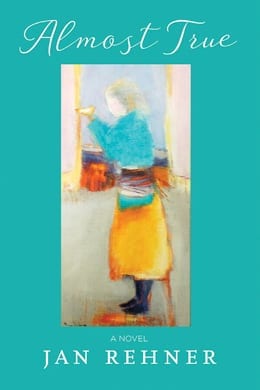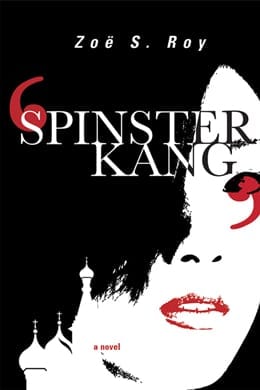It’s 1942, and the Nazi Juggernaut continues to crush Europe, while on the island of Newfoundland the loss of a generation awaits. Two girls who are best friends heading into their last year of high school visit a local park—and their lives are changed forever. The beautiful, talented Angela faces loss and then a darkness, a darkness so shameful that she cannot share it with anyone, not even her best friend. Dorothy faces the prospect of becoming the island’s first “lady lawyer,” one who offers hope for women seeking salvation from the chauvinism that dominates domestic life. A fearless examination of the monumental barriers that have stood in the way of women, My Best Friend Was Angela Bennett is a story of how a friendship endures through the most difficult of times.
“With searing clarity and poignant insight, Suzanne Hillier takes readers deep into one woman’s personal hell. My Best Friend Was Angela Bennett is a transformational exploration of abuse, sadism, shame, entrapment, and injustice. This tragic account of why one woman stays sheds light on the psychological and physical horrors of domestic violence. A truly harrowing journey.”
—Angie Abdou, author of The Bone Cage
“If you’re always looking for another book to read, as I am, this is a brilliant choice. What engaging storytelling! Suzanne Hillier is overdue to burst on the literary scene.”
—Adair Lara, former columnist for the San Francisco Chronicle
“Suzanne Hillier’s My Best Friend Was Angela Bennett is a fierce, provocative novel about love, loyalty, and survival. With exacting, often witty prose, Hillier explores a time and place of narrow expectations for women and the chasm spousal abuse creates between friends. This novel is harrowing, funny, tender, unforgettable. It will stay with you.”
—Libby Creelman, author of Walking in Paradise
“An unflinching, often searing, account of two women’s lives and enduring friendship in Smallwood-era Newfoundland.”
—Ed Riche, author of Rare Birds
powered by Crowdcast
18. Creating a Precedent
In September 1946, Wills and I were admitted to Dalhousie law school. I was the only woman in a class of fifty men. “I want you to remember, gentlemen, that there is now a lady in our midst. I would caution you to watch your language at all times.” Professor Dryden had authored the well-respected Dryden on Contracts, which he had taught at the university for fifteen years. There were general snickers around the class, and I felt my face burn. Next to me Wills was shaking in his seat with barely contained laughter.
“Arsehole,” I hissed and kicked him as hard as I could on his good leg.
“She’s a Newfoundlander,” croaked a voice from the back.
“Am I to surmise that this disentitles her to the label of ‘lady’?” scolded Dryden. “And am I to conclude that Newfoundland women tolerate swearing?” This produced another even louder snicker from my male colleagues.
They called me Lady Campbell for the next two months, then Lady, and finally Campbell Two. Wills was Campbell One. He was really popular. I led the class in contracts, which should have sent a message to everyone, including Professor Dryden, and certainly Wills, who ended up with a B minus.
We went home for Christmas in time to see Angie’s new baby boy, a beautiful child with Angie’s face. Edgar for once was pleasant and civil to us when we attended the reception following the christening.
“I hope,” I whispered to Angie, “the empty pocket is filled.” I went home 1947 to work in Pop’s law office for the summer. Wills was doing a two-month stint with the Justice Department. In the summer of 1947, politics, the island’s favourite blood sport continued to heat up, as it had since the establishing of a National Convention the previous year. The choices of the future electorate were an independent island, called Responsible Government; a continuation of Commission of Government, which neither the British or the Newfoundlanders wanted; or even an economic union with the United States. The island’s love affair with the Americans—or Yanks—was ongoing, as not only had their bases provided employment, but they had married thousands of local girls. But another option was surfacing.
Joey Smallwood—five-foot-four and one hundred and thirty pounds, complete with bowtie and owl-like glasses; a failed businessman but successful journalist and spellbinding speaker—was everywhere. His radio show, known as The Barrelman, had reached all corners of the island, an island he was now bombarding with ceaseless propaganda on the benefits of Confederation and the necessity of adding it as an alternative to the National Convention’s choices. In some ways, he was right. Poverty would be eradicated—but at a price. The islanders were reluctant to lose their unique identity.
“If they gave you an enema, they’d bury you in a shoebox,” croaked one phone-in listener to Joey on his radio show, sick to death of listening to him. The comment sent Pop into paroxysms of laughter when he repeated it at dinner.
I visited Angie during lunch hours, at times when she told me Edgar was not coming home, and even briefly in the mornings, when I noticed Edgar had left for work. I did not want to visit when he was home. Angie was always so nervous, and I saw that he was always hovering, listening to our conversation so I had to be careful what I said. I knew he resented my visits. In the mornings, I watched as Angie poured our tea, noting her fragile, pale hands as she held the china teapot and the mauve smudges under her eyes. I ached with concern for her.
I saw Angie, the perfect mother, with a son, Robert Edgar, who was perhaps not as perfect. “He’s only now rolling over and sitting up, and he’s nine months old. I’ve seen a physiotherapist and read books to help me learn how to strengthen his muscles.” Her devotion was endless: focused and all-consuming. Edgar, on the other hand, had gone back to his usual scowling self.
“We won’t be held responsible for this,” Hettie hissed to me. “Edgar has two cousins severely retarded, and his sister’s strange and had to go to a special school. If I’d known, I’d have stopped the marriage. I could have, you know. Angie was never that anxious to marry; she just sort of went along with it because he kept pressuring her. He refers to little Bobby as Dud or Dumbo—a horrible man. Poor Angela. And she stayed in bed for nine months to have the child.” Hettie was on the right side for once. I watched her with this still, beautiful child, finally sitting up, and always with a smile. She played with him, using soft toys to hide and then pop up and tracing little circles in his palm. She tickled his arms with her fingers, which then ran up like mice and settled under his arm. She’d do anything to encourage a little animation. For the first time, I liked her. And it was sad: her only grandchild. There would be no more. The Montreal neurologist and a geneticist had cautioned Angie that similar problems could happen with any future children—not that Angie could carry another.
“Mom’s so good with Bobby,” said Angie. “She’s read up on treatment for slow children, and she’s so devoted.” I noted the word slow rather than retarded or handicapped, which Bobby assuredly was. I thought of how Edgar calling the child Dud and Dumbo must hurt her.
“Look at him! He’s trying to crawl,” Angie lilted one afternoon. “He’s such a good boy.” It was after five o’clock in August, and I was back from Pop’s office. I thought I’d drop in, hoping Edgar would be late from his printing shop, but in he came, scowling as usual.
“Have we been so busy with Dumbo that we haven’t made dinner?”
A shadow passed over Angie’s face. Conscious of my presence, she said brightly, “Not to worry, there’s a casserole in the oven.”
“She’s making the Dud into a little suck,” he complained. “If he was normal, he’d be a genius by now.” He averted his eyes from Bobby and told Angie he’d be taking his dinner in the dining room.
“I have to leave,” I said. “I have to help Ma with dinner. It’s unfair to have her serve two extra every night.”
“You don’t have to go,” Angie pleaded. “Let me get you a drink. Edgar always has lots of booze around.” She lit a cigarette and I noticed a slight tremor in her hand.
>“I really can’t, luv,” I said. “Bobby’s really making progress, and it’s all due to your efforts.” I kissed her. She smelled of cigarettes and sadness.
“And Mom’s,” she said.
“He even resents that sweet little boy,” I later stormed at the dinner table. “He calls him ugly names and resents the fact that Angie’s devoting her life to helping him.”
“She should have left him after the honeymoon. That should have been enough,” Wills growled. I saw Ma’s face and knew she was bursting to know what had happened on the honeymoon.
“I never liked him, Dottie. He was always such an odd duck. The way he used to watch little Angie …”
”Now that it looks like we might be joining Canada, she can get a divorce someday,” said Pop. “We’ll all be dumping our old harps after Confederation—won’t we, Lil?” Ma merely gave him a blank look, as if being compared to an aged female seal were an everyday occurrence.
“I was thinking of dumping Dot,” added Wills. “Can’t have a wife getting better marks than her husband in her law exams; it’s crushing to the male ego.”
Everyone hooted. Pop was very proud of me. If you had to have a daughter, at least you could take pride in the fact that she was smart enough to become a lawyer and to marry a guy you could have a few laughs with.
Before I left for second year I went over to say goodbye. The early fall sun poured through the windows of Angie’s living room and illuminated the face of Bobby, who was now crawling on the thick floor rug. Angie was wearing a sleeveless blouse, and I could see that her arms were white and thin. I rubbed her upper arm and felt its coolness through my fingertips. I felt a sense of sadness, an urge to protect her, and a sense of frustration at what I feared to be my own lack of action. “You were going to leave,” I whispered, although we were alone. “You even saw a lawyer. You weren’t going to back down—you promised. And I wanted to help. Now you never mention it.”
“Dr. Cam died, and other things happened. I still want to leave, but now it’s more difficult. Perhaps when you become a lawyer you can help.”
I said, “Oh Angie,” and placed my arms around her. It was like embracing a statue. I felt she was frozen in some sort of time warp, where she remained remote. Then I felt her sobbing against me, and I felt the same futility I’d felt after her honeymoon. “You must,” I said, no longer whispering, “let me help. I know things are going on, bad things, things you don’t want to share. But I can’t help unless you let me.”
She didn’t answer. She only looked at me with tear-filled eyes, and said softly, “I’ll miss you, Dottie.”









Inanna Admin –
My Best Friend Was Angela Bennett by Suzanne Hillier
reviewed by I’ve Read This – March 16, 2022
https://ivereadthis.com/2022/03/16/my-best-friend-was-angela-bennett-by-suzanne-hillier/
I’ll admit to being a bit confused about what My Best Friend was Angela Bennett by Suzanne Hillier was when I picked it up – a non-fiction account of a particular woman during WWII? A tale of female friendship loosely based in reality? A memoir? In my defense, I received the printed pages of it, so I didn’t even have a cover to go by. It wasn’t until I looked more closely at the blurb from the publisher that I realized this was historical fiction – and thank god for that, because the subject matter is quite heavy, even traumatizing. So I’ll offer a trigger warning of my own; this book describes the repeated sexually sadistic actions of one man against his wife, plus descriptions of the physical abuse he experienced as a child. It’s horrible to read about, but it doesn’t continue throughout the entire novel – mercifully, it ends about halfway through. The rest is a delightful look at a particular woman’s battle for female rights and equality.
Plot Summary
Beginning in 1942 we meet two best friends, Dorothy and Angela, teenagers living in Newfoundland and doing what teen girls do; having fun, worrying about school, and living a somewhat carefree life despite the war looming ahead of them. Angela meets Danny and falls deeply in love with him, but their love is not able to withstand the ravages of the war overseas. Instead, Angela marries Edgar, the strange man across the street who was always obsessed with her, and thus begins a torturous marriage in which she is trapped, not even being able to divorce at that time due to the laws of Newfoundland (still yet to become a part of Canada). Dorothy watches Angela’s spiraling in horror, but unable to break through her best friend’s shame and secrecy, Dorothy begins to focus on her own life, making use of her incredible intelligence to forge a new path for female lawyers. The challenges that both women face are thankfully not as prevalent today, and there are now social supports set up that in theory, should assist women like Angela. However the career struggles that Dorothy faces sound all too familiar to a working mom like myself, so although this is historical fiction, it’s not so far in our review mirror as we like to think.
My Thoughts
Once I became accustomed to the initial violence of Edgar’s character, I was able to settle into the friendship between Dorothy and Angela and rely on it for its strength and hope in the otherwise dark plot. In many ways Dorothy and Angela are opposites, and like Dorothy, I vacillated between frustration and pity for Angela. She makes entirely foolish decisions, but blaming the victim clearly doesn’t make sense for Dorothy or the reader, so instead we focus on how Dorothy can help Angela, and other women like her as she builds her own legal career (apparently Hillier was a trailblazing lawyer herself, so she wrote with authority on this topic). Despite Dorothy’s intelligence and strong work ethic, there are still barriers to her ‘having it all’, and it is still ultimately the men around her that determine Dorothy’s success; her supportive husband and father, the male judges who resent Dorothy in their courtroom, and the husbands of the female clients she takes on, are all examples of how agency is often taken away from her, for better or for worse. Simply working full-time as a wife and mother in the 50s is its own mountain to climb:
“‘A man can miss things because he has a wife who fills up the void,’ I said. ‘He’s expected to put his work first. A man doesn’t have the guilt. It’s different when you’re the wife and mother. There are things you expect of yourself, and your kids expect, things that you can’t do because you’re so busy’”
Sadly, I’ve said very similar things to other friends of mine, in fact the above quote can easily be transplanted into a book published in 2022 and it would be entirely believable. Perhaps the expectations have changed slightly, but the pressure working mothers put on themselves has never been higher, thanks to the ill effects of social media – but that’s a blog post for another day. The strength in this writing is the remarkable ability of Hillier to make these women, much older than me, so relatable and real to a reader in 2022.
My only complaint about this book, and it’s a minor one, is the vast difference in tone from the beginning to the end. We could feel that something bad was coming to Angela, in more ways than one, and of course it did. But when we focus on Dorothy’s career and her life, which is still a considerable challenge but on an entirely different level than Angela’s, I found it difficult to come down from the horrors at the beginning. I’m not especially sensitive to abuse, but I found it so disturbing that it coloured my reading of the rest of the novel. So if you choose to read it after this review, you will be going into it with eyes wide open, which is what I recommend.
Marion Smith –
Isn’t it wonderful when you find a book that totally draws you in? Well this 5 star novel by Suzanne Hillier does just that. It’s an extremely powerful story that emphasizes the power and importance of female friendship. Poor Angela, after her true love dies in WWII, finds herself in a domestic violence situation when she marries a man who turns out to be a sexual sadist. Parts of the novel are definitely tragic and disturbing, and yet parts are filled with love and hope. One element that is consistent throughout is that the author’s written word keeps you on the edge of your seat for every nail-biting moment. This book does what every book should do—it makes you feel and relate to the joy, sadness, fear, challenges and hope that the characters experience. Every woman has stories to tell about the men in their lives and their female best friends that are always there for them no matter what. Simply speaking, this book is a must read on your reading list!
Inanna Admin –
My Best Friend Was Angela Bennett by Suzanne Hillier
reviewed by Jon G. Bradley
Historical Novel Society – May 2022
https://historicalnovelsociety.org/reviews/my-best-friend-was-angela-bennett/
In this novel, at times emotionally charged and physically graphic, the reader is drawn into the lives of two female friends as they navigate a stressed geopolitical reality. Dark personal descriptions play out in an environment that is not conducive to gender equality, with its overarching patriarchal society stuck in a restrictive past that resists change.
Longtime friends Dorothy and Angela have been raised in isolated Newfoundland, which is shaped by its own stilted history, with limited engaging life choices for women. Amid this atmosphere, the two attempt to find their own safe places. They struggle with family traditions, situational norms, gender expectations, World War One memories, and economic realities, as well as with their own emerging aspirations.
“There are other things I’ll be doing to you. You must try to adjust, to make friends, with the pain.” Readers are immersed in the horrific world of sadism within a marriage. Resolutions are few, and escape seems impossible. Occurring over the period from World War Two through the following decades, this is a most compelling tale that juxtaposes real-life struggles against the contemporary political uncertainties wrought by war and its inevitable, evolving consequences.
In reality, lives do not always reach a pleasant resolution, and so it is with Dottie and Angie. There is indeed personal progress, a denouement of sorts, but at costs that some readers may find unsettling.
Inanna Admin –
Historical Fiction from a Lawyer Who Saw It All
My Best Friend Was Angela Bennett by Suzanne Hillier
reviewed by Joanne Poncavage
BookTrib – January 6, 2023
https://booktrib.com/2023/01/06/historical-fiction-from-a-lawyer-who-saw-it-all/
“I remember the summer my best friend Angela met Danny.”
The first sentence of My Best Friend Was Angela Bennett (Inanna Publications) by Canadian author Suzanne Hillier might seem to hint this book is a light-hearted romance. It soon becomes clear it’s something much more: a historical fiction novel that chronicles one woman’s crusade for women’s rights and equality in a male-dominated society. It’s a vivid portrait of female friendship in an age and place where feminism was a far-off dream.
Two Women’s Diverged Paths
In 1942 in St. John’s, Newfoundland, Angela and narrator Dorothy are enjoying the summer before their senior year in high school. Angela is blossoming into a beauty with thick curly chestnut hair, swelling breasts and shapely legs. Once extremely shy, she’s warming to all the compliments she’s getting for her looks and her singing voice. Dorothy, on the other hand, is too tall, too thin and too flat-chested, with straight dark hair — and the one headed for college.
On the brink of womanhood, they pretend to know all about sex, but all they know for certain is that it’s virginity or marriage, and if you weren’t married by age 20, you were an old maid.
Enter Danny. One day at the swimming pool, he notices Angela and never takes his eyes (or his mind off) her again. He’s a bit of a tough guy with dark hair, muscled arms and a pack of Lucky Strikes rolled in his t-shirt sleeve.
Although she truly loves Danny, Angela hesitates to introduce him to her parents, especially her prim and proper Protestant, businesswoman mother. Danny’s an unemployed, Irish Catholic high school drop out. His father’s a drunk. Danny’s solution is to enlist in the navy. He buys a “serviceman’s special” engagement ring for Angela, and ships out for the war in Europe.
The plot soon pivots to Dorothy, who surprises everyone by deciding to follow in her lawyer father’s footsteps and becomes the first woman ever admitted to Dalhousie University’s school of law. Soon she’s Newfoundland’s first female lawyer, specializing in family law. Also unusual for the 1940s, she does it all while balancing marriage and motherhood. Even more surprising for the time, her husband is very supportive.
As she represents women in intolerable situations, Dorothy earns a reputation for being aggressive and outspoken. Judges despise her, and male lawyers call her the “Great White Shark.”
Angela, on the other hand, is in trouble, trapped in a marriage from hell. Not even Dorothy can break the spell.
A Historical Fiction Novel Based on Personal Experience
At the time, women’s rights were practically nonexistent. Women with abusive, alcoholic husbands could divorce, but might not receive child support. At a time when few women worked outside the home, chances they could survive economically on their own were slim.
A word of warning: The book’s descriptions of sadistic sex are graphic and difficult to read. Just as difficult is realizing how little has changed for women trying to escape their abusers in the decades since. Hillier does a good job describing the guilt and shame of abuse and how difficult it can be for women to break free.
Hillier writes from experience here. One of five women in a graduating class of 150, she became a trailblazing divorce lawyer and established her own law firm in Ontario in the 1970s. In an interview in The Toronto Star, she said she earned the nickname, “The Barracuda” as she represented “hookers and transvestites.”
After retiring from her practice, Hillier, then in her 80s, returned to her first love, writing. In 2017 she published Sonja & Carl about a romance between a hockey player and an intellectual that is challenged when he suffers brain trauma. In 2011, she published Divorce: A Guided Tour.
Hillier is now in her 90s; let’s hope she is working on more books that reflect her eventful life.